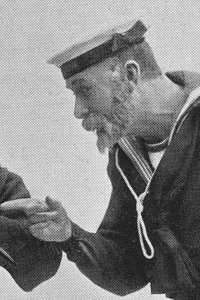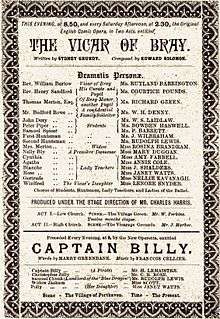Rudolph Lewis (singer)

Rudolph Lewis (c. 1844 – 21 November 1917) was a bass-baritone known for creating several small roles in the Gilbert and Sullivan operas including Go-To in The Mikado (1885) and Old Adam Goodheart in Ruddigore (1887).[1]
Lewis worked as a wood engraver for at least two decades before beginning a performing career. In 1884, at the age of 40, he joined the D'Oyly Carte Opera Company, with which he performed steadily for the next decade at the Savoy Theatre. He sang in the chorus, created small bass roles such as Go-To, Old Adam, Samuel Chunk in Captain Billy and Sing-Song Simeon in Haddon Hall, and he played such other roles as the Boatswain in H.M.S. Pinafore.
He later taught music. In 1900, after playing a role at the Adelphi Theatre, he toured, again with D'Oyly Carte, in The Rose of Persia as the Royal Executioner, and later performed with the company in London. His other roles during this period included So-Hi in The Willow Pattern, a Tinker in Merrie England and Jem Johnson in A Princess of Kensington both in London and on tour. He performed in The Earl and the Girl and Little Hans Anderson and The Talk of the Town from 1903 to 1905 and continued to sing and act until the First World War.
Early life
Lewis was born in the City of London, the son of Elizabeth (née Costin) and Joshua Lewis (born 1815), a straw hat and bonnet blacker.[2] In 1861 the 15 year old Rudolph Lewis was a wood engraver,[3] an occupation he was still following 20 years later.[4] He married Frances (née Dalton) in Lambeth in 1873,[5] and the couple had a son, Rudolph Charles Lewis (1877–1942)[6] and a daughter, Frances (born 1882).[2]
Singing career

By October 1884, at the age of 40, he was performing at the Savoy Theatre in the chorus of the D'Oyly Carte Opera Company in the revival of Gilbert and Sullivan's The Sorcerer and Trial by Jury. In March of the following year he originated the small role of Go-To in The Mikado,[7] as the baritone voice of Frederick Bovill was not deep enough to bring out the bass line in the madrigal "Brightly Dawns Our Wedding Day".[8] Lewis stayed at the Savoy Theatre with D'Oyly Carte until 1893, during which time he created the role of Old Adam Goodheart in Ruddygore (1887).[9] Of Ruddygore, George Grossmith later wrote of his performance with Lewis:
"Sullivan used to amuse himself by making me sing bass in one number of an opera and tenor in another. In Ruddygore, Sir Arthur had engaged a man to play the servant ... who had an enormous bass voice, and who had to go down to the lower E flat. Singularly enough, he could go down to G, and then he dropped out entirely, and I did the [low E-flat] below. Generally the audience roared with laughter, and it absolutely brought down the house."[10]
Lewis appeared in the first revival of H.M.S. Pinafore (1887–1888) as the Boatswain, Bob Beckett, and in the chorus for the first revival of The Pirates of Penzance (1888). In June 1887 with Grossmith, Rutland Barrington, Richard Temple and other D'Oyly Carte colleagues, he appeared in the benefit performance of Trial by Jury for Amy Roselle at the Lyceum Theatre on a bill that also included Henry Irving and Ellen Terry.[11] He reprised the role of Go-To in the first revival of The Mikado (1888) and originated the role of the Fourth Yeoman in The Yeomen of the Guard (1888–1889).[12] He was in the chorus for The Gondoliers (1889) and was later promoted to the role of Ottavio in April 1890. During the run of The Nautch Girl at the Savoy, he originated the role of Samuel Chunk in Alfred Cellier's companion piece Captain Billy (1891)[13] and played the Second Huntsman in The Vicar of Bray (1892) before creating the role of Sing-Song Simeon in Haddon Hall (1892).[14] Lewis left the D'Oyly Carte Opera Company in early 1893.[1]
In January 1900 he played Dido Bunce in Two Little Vagabonds by George R. Sims at the Adelphi Theatre.[15][16] After this, he toured, again with D'Oyly Carte, in The Rose of Persia as the Royal Executioner, from April to December 1900. In the 1901 census Lewis described himself as a Professor of Music.[2] Also in 1901 he returned to the Savoy where he was a chorister in The Emerald Isle, appearing in some performances as Sergeant Pincher. He next played So-Hi there in the shortened version of The Willow Pattern that played as the curtain raiser to the 1901 to 1902 revival of Iolanthe. Next, in Merrie England (April 1902), he created the part of a Tinker[17] and then played Jem Johnson in January 1903 in the original production of A Princess of Kensington before playing the role on tour in May 1903.[1]
On the conclusion of the tour Lewis left D'Oyly Carte and was at the Adelphi Theatre (and later at the Lyric Theatre) in The Earl and the Girl from December 1903.[18] At the same time he appeared in 23 matinee performances of Little Hans Anderson at the Adelphi. He appeared with Walter Passmore and Henry Lytton in the musical The Talk of the Town (1905) by Seymour Hicks at the Lyric Theatre[19][20] and played in the June 1906 matinee performance of Trial by Jury to benefit of Ellen Terry, alongside W. S. Gilbert and many of his old D'Oyly Carte colleagues, at the Theatre Royal, Drury Lane.
Later years
In his later years he seems to have been relegated to the chorus in various productions. He was credited as an "attendant" in The Golden Doom at the Theatre Royal Haymarket in 1912. On his death in Lambeth in 1917 Variety stated that he had been "recently playing at Daly's", but it is not recorded in what capacity.[1][21]
References
- 1 2 3 4 Stone, David. "Rudolph Lewis", Who Was Who in the D'Oyly Carte Opera Company, 27 August 2001, accessed 13 May 2018
- 1 2 3 "Rudolph Lewis", 1901 England Census, Ancestry.com (subscription required)]
- ↑ "Rudolph Lewis", 1861 England Census, Ancestry.com (subscription required)]
- ↑ "Rudolph Lewis", 1871 England Census, Ancestry.com (subscription required)]
- ↑ "Rudolph Lewis", England & Wales, Civil Registration Marriage Index, 1837–1915
- ↑ "Rudolph Lewis", 1881 England Census for Rudolph Lewis, Ancestry.com (subscription required)]
- ↑ Savoy Theatre programme The Mikado, original 1885 production, accessed 13 May 2018
- ↑ Ainger, Michael. Gilbert and Sullivan: A Dual Biography, Oxford University Press (2002), p. 257
- ↑ Ruddigore First Night Cast List, Gilbert and Sullivan Archive, 25 August 2011, accessed 13 May 2018
- ↑ Grossmith, quoted in Wells, Walter J. Souvenir of Arthur Sullivan. London: George Newnes, 1901
- ↑ Programme for Trial by Jury, The Lyceum Theatre (16 June 1887), via c20th.com: A selling exhibition of memorabilia, accessed 13 May 2018
- ↑ Glinert, Ed (ed.) The Yeomen of the Guard, The Complete Gilbert and Sullivan, Penguin Books (2006), accessed 13 May 2018
- ↑ Captain Billy Cast, Gilbert and Sullivan Archive, accessed 13 May 2018
- ↑ Wearing, p. 135
- ↑ Wearing, p. 2
- ↑ Cady, Thirza. Two Little Vagabonds (1900), The Adelphi Theatre Project: A Record of Dramatic Performances at a Leading Victorian Theatre (1899–1900), accessed 13 May 2018
- ↑ Wearing, p. 94
- ↑ Wearing, p. 163
- ↑ The Talk of the Town (1905) University of Kent Special Collections and Archives, accessed 13 May 2018
- ↑ Play Pictorial, v. 5, 1905, No. 32
- ↑ "Rudolph Lewis", England & Wales, Civil Registration Death Index, 1916–2007 (1917), Ancestry.com (subscription required)]
Sources
- Wearing, J. P. The London Stage 1900–1909: A Calendar of Productions, Performers, and Personnel, Rowman & Littlefield (2014)